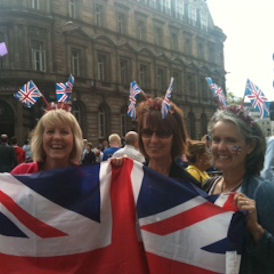The party’s over: How to deal with post-Olympic depression
It has been an amazing party – but now the London 2012 Olympic Games and Paralympic Games are over, and the nation is facing a hefty hangover. What next? Let Channel 4 News be your guide.
For one summer, it was wonderful. We laughed, we cried, we planned our days around watching sports we had previously never even heard of. There was always something good on television, the nation had something to talk about other than the weather, fireworks became almost a fortnightly occurrence and we completely abandoned our stiff upper lip.
But it’s all over now. For many people in the UK, the end of the London 2012 Olympic Games and Paralympic Games has sparked a major come-down – or, as it has been dubbed, post-Olympic (and Paralympic) depression.
“It’s going to be hard. I’m welling up just thinking about it,” Jane Welsby told Channel 4 News as she watched the “Our Greatest Team” parade stream through London.
“I’m going to need rehab. I’ll have withdrawal symptoms,” said another spectator, Lesley Newell.
I’m going to need rehab. Olympics and Paralympics fan, Lesley Newell
So as a nation shares that “back to school” feeling, Channel 4 News has been inspired by one of the songs played at the Olympics closing ceremony – Always Look on the Bright Side of Life, by Eric Idle – to provide some suggestions to get readers through the dark days ahead.
Next steps
To get you over the initial hump – the first cut is the deepest, after all – here’s a bit more sporting action. Gold medal-winning tennis player Andy Murray takes on Novak Djokovic tonight in the US Open final in a bid to win his first ever grand slam, and the odds could be on his side. He beat Djokovic to reach the Olympic final.
Or perhaps you want to commemorate the last few weeks, in which case Twitter user Jeremy Sleath has a plan.
@channel4news I renamed my bathroom ” The Aquatic Centre” in tribute to #Olympics #Paralympics
— jeremy sleath (@sleathcorps) September 10, 2012
Psychologist Dr Fergus Neville has done research into crowds, and what it feels like to be part of a big joint experience, with strangers. Conventional wisdom tells us that crowds are bad for people, and can lead to panic and mindless violence. But Dr Neville’s research – as well as the testimony of many watching the Olympics and Paralympics across the country – challenges that perspective.
“People can have profoundly positive experiences taking part in crowd events, and part of the reason for that positivity is because of the change in social relationships,” he told Channel 4 News.
“So strangers are no longer other, but become part of yourself, fellow supporters of your team – be that football, the Olympics, or on a political march. That sense of one-ness with other people, that intimacy – that can be such a profoundly positive and emotional experience.”

And can we replicate it now that the Games are over? Possibly, Dr Neville says. He believes that the best way to get over the post-London 2012 blues could be joining a group activity such as a sports team or activity club.
“I think in terms of the Olympics, one of the things people most enjoyed, as well as watching the British athletes triumph, was that change in relationships – strangers talking to each other in front of big screens and things like that. One of the ways to get over that sense of loss of group participation is to participate in different groups – sporting, musical or political,” he said.
Peni Hargreaves on Facebook, responding to Channel 4 News, agreed with Dr Neville.
“I’m taking up cycling,” she wrote in a post which will surely please the Games organisers, whose mission was to “inspire a generation”.
For the haters
On the other hand, there are some out there who are sick of the whole jamboree.
“Thank God it’s over,” said Paul Ferry Smithlz on Facebook.
“I may go to see a play; hopefully all the money that was diverted from the arts will start to find its way back,” Liam Murphy suggested.
Others felt that it was time for the UK to wake up from the dream to tackle our real, and ongoing, economic and social problems.
When asked what the UK could do instead of watching the Games, James Coull-Kidd said on Facebook: “We’ll be occupied by the lack of human excellence and achievement of our politicians and business leaders.”
And Twitter user @Saramo responded that he would cope with the absence of the Games “by watching PMQT and staying mad”.
Legacy?
Of course, as these readers have suggested, there are some serious questions to be answered about the legacy of the Games about sport, attitudes towards disability and indeed what will become of the Olympic Park itself.
Twitter user @oneandonlydebs said: “For the first time ever in this country I had a few days where being disabled was not a traumatic experience. So yes I will [miss the Games].”
Jane Welsby’s sister Cath competed in the 1984 equivalent of the Paralympic Games, winning a gold in the high jump.
She told Channel 4 News: “I’m blind myself and I think the positive thing is how the Games have changed attitudes. That’s a legacy – if we can talk about what we can do – not what is going to be difficult.”
The legacy question will be answered in the coming weeks and indeed the coming years – and our No Go Britain campaign will be keeping a close eye on whether life changes for disabled people as a result of the Paralympics.
But if you can’t wait until then, there’s always 2014 – when the Commonwealth Games hit Glasgow.